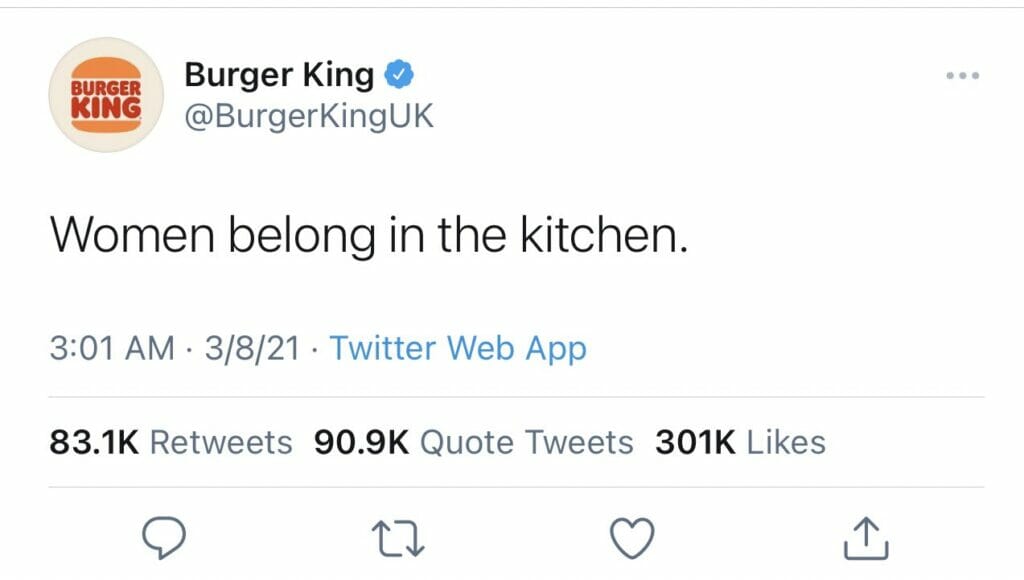There’s no denying that shock tactics hold power. They get us talking. Encourage us to read on. Make campaigns memorable. And when it’s done right, whether it’s through some clever copy or a real-life stunt, the impact can be immeasurable and sometimes spark real change.
We’ve seen countless brands use these tactics to garner some attention from consumers and the press. Sometimes it’s all in good fun; remember when Weetabix caused chaos in Britain by putting baked beans on top of its cereal? Carnage! Other times, it’s to educate, inspire, spark conversation; I still often think about ITV’s Project 84 that drew attention to male suicide rates by placing mannequins on top of the This Morning studio.
The reasons above are all, in my eyes, perfectly valid. The Weetabix stunt had no real message, it was just something to get us all talking for an afternoon and provide some light relief. Project 84 followed up its stunt with stats and awareness that could, literally, save lives.
But just because shock tactics have a good track record of paying off, doesn’t mean they should be treated as a go-to for marketeers to capitalise on for the sake of their or their client’s brand.
With this in mind, let’s take a look at what Burger King tweeted yesterday for International Women’s Day…
“Women belong in the kitchen.”

If like me you furrowed your brow and clicked on the tweet, wondering if Burger King had been hacked, you’ll have seen the immediate follow up of:
“If they want to, of course. Yet only 20% of chefs are women. We’re on a mission to change the gender ratio in the restaurant industry by empowering female employees with the opportunity to pursue a culinary career. #IWD”
The intent here is clear and I fell hook line and sinker for it. The sentiment is also there; Burger King shouldn’t be chastised for wanting to continue diversifying its workforce. The issue, however, lies in how empty and potentially damaging the initial shock tactic is.
The idea of women ‘belonging’ in the kitchen is one that drums up images of 1950s housewives, doting on their bread-winning husbands. It’s ancient and harmful, which is why Burger King used it. But looking back, it’s just an empty statement. The shock isn’t in a hard-hitting stat or groundbreaking piece of content. It’s in a harmful message that didn’t need to be said.

Moreover, it seems as though whoever was behind the idea has looked over how social media works.
By putting this tweet out as a standalone, it puts Burger King at risk of their statement easily being taken out of context. Now, anyone that sees this later down the line won’t have to look far to understand the context around the tweet but by that point the damage might have already been done; and it won’t be Burger King dealing with the consequences.
While that 1950’s housewife might be a symbol of the past, the ideologies that were commonplace back then haven’t completely vanished from our society now. In an age of reaction images and gifs, how many right-wing misogynists will take pleasure in using Burger King’s tweet to antagonise women online?
That’s not to say it’s Burger King’s fault if this does happen – but the responsibility of a global brand weighs heavy and it seems as though it’s been overlooked in this instance in a bid to get a viral tweet that has everyone talking (and no, the irony here is not lost on me) which ultimately just feels cheap.
I think the lesson to be learnt here is for brands not to use days dedicated to supporting and lifting up marginalised voices as an opportunity to go viral. As a Queer man, I spend much of Pride month looking cynically at brands that swap out their usual logos for a rainbow version to show their support of the Queer community without actually doing anything to support LGBTQ+ people. And while Burger King has committed to diversifying its workforce (so it’s not exactly the same) the sentiment is lost because of the tactics employed to inform you of the reason behind the tweet.
And what happened next…? Well they deleted the tweet and published an apology. But sadly, I think this may happen again. And while brands may always mean well, the delivery of these statements should be examined in detail before they go live. While Burger King may not have got as much attention by releasing its workforce gender split and commitments to improving, at least that’s what will have been remembered and not a statement that is, undoubtedly, sexist, regardless of the context that followed.



